Share This:
April 25, 2013 | Theatre,
The Gods of the Season
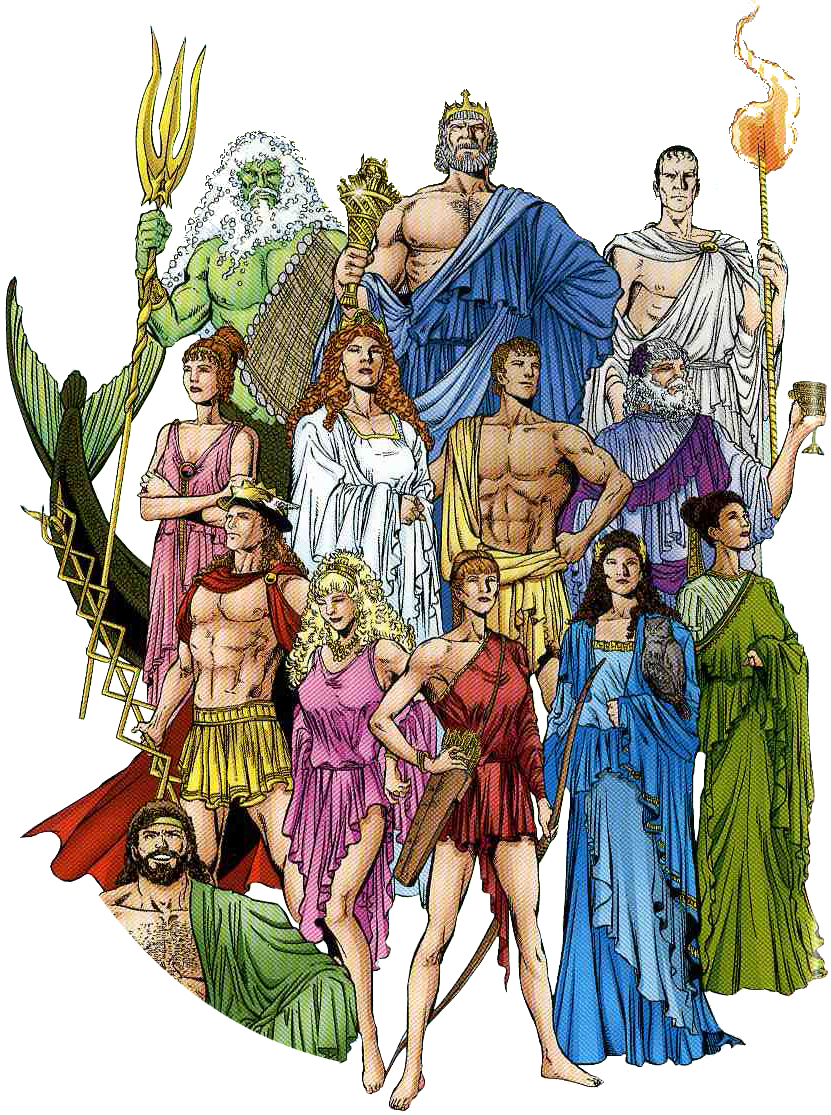
We are the playthings of the gods.
They walk beside us.
They whisper in our ears.
They dazzle our eyes.
We must follow
Where they lead us.
If we defy them, we suffer.
If we obey them, we suffer still
But our lives are crowned with glory.
-Odysseus, Trojan Women (After Euripides)
There have been a lot of gods around lately, at least here at ArtsEmerson. It has turned out to be a good year for the ancient poets—in the fall, there was local fringe company Whistler in the Dark’s inventive staging of Ted Hughes’ Tales from Ovid; just last week Anne Bogart’s SITI Company delivered the tragic Euripides play Trojan Women, newly adapted for the stage by Jocelyn Clarke; and this weekend we return to Troy with Lisa Peterson and Denis O’Hare’s one-man epic An Iliad.
The gods are smiling down on the Paramount Center from their perch on Olympus. However, I must confess a certain amount of ignorance about these celestial powers. Being under the age of 30, most of my knowledge of Greek gods has been informed by Disney’s Hercules (to know it is to love it) and a scattered reading of Ovid in a literary foundations course. Maybe you’re watching these shows and you’re in the same boat.
A quick Google search for these gods brings up some fascinating links to fan-fiction, anime and some of the driest academic writing you will be able to find on the modern interwebs. I’m voting we have some fun learning about the gods and connecting them to the shows. (WARNING: Baby Pegasus pics on the horizon.) Without further ado: the gods of the season. (Roman names in parentheses for fun and confusion.)
Zeus (Jove)
The big guy for both the Greeks and the Romans has always been Zeus/Jove, Father of the Gods and Men and god of sky and thunder. Disney duped us by leading us to believe this guy was faithful to his beautiful wife Hera, but we’ll forgive them for it.

In Tales from Ovid, we heard of two of Jove’s conquests: Callisto and Semele. Basically, Jove was cleaning up the mess from the chariot crash (see: Apollo/Phoebus) and he ran across the goddess Diana’s favorite nymph Callisto. In an abnormal method of seduction, he cross-dressed as Diana herself and convinced Callisto to sleep with him. (New pick-up strategy: Hey ladies, who needs a god when you could have a goddess?) Of course, birth control wasn’t really on Callisto’s radar so she ended up baking a little something in the oven. When Juno (aka Hera) discovered this infidelity after the baby popped out, she promptly turned Callisto into a bear who was then killed by her son when he grew up to hunt… bears. Anywho, Jove took pity on them and spun them into constellations. Casual. Then, of course, sometime later, Jove is back at it again, this time with Semele. When Juno hears about this pregnancy, she goes to Semele disguised as an old nurse and tells her to ask to see Jove naked. (How this hadn’t occurred during the act of baby-making? Who knows. Mythology.) Semele makes Jove promise to give her anything she wants, and of course she wants him in the buff. Not wanting to break his promise (hmmmm), Jove comes down all like BAM! and he was just too much so Semele burst into flames. Fear not, though, the baby was saved and put to incubate in Jove’s thigh. A nice thigh-birth. Don’t you miss those days? (Side note: that baby became the god of partying, Bacchus.)
Trojan Women showed a more power-hungry god. It is Zeus who prompts the women to have a Miss Olympus competition in front of Paris in order to get the golden apple that lore says launched the taking of Helen of Sparta. Later on, the Chorus calls upon Zeus to send down one of those infamous lightning bolts. (I’m sure you remember Hercules playing with them in the Disney movie? Right.) Insert: intense image to jog memories.

Fierce. In An Iliad, Zeus is kind of absent for a lot of things until the end. (Maybe he was putting the moves on some ladies, who knows.) When it comes to the big moment—the fight between Hector and Achilles—Zeus casually takes out his rusty scales of justice and starts weighing the lives of these two men. Sorry, Hector. You lost. Time to go to the House of Death. (Is this a really bad garage band name? Possibilities, y’all.) Not to fear, though. Zeus is never too troubled by death. Once Hector is dead and there are days of peace for mourning, the Big Guy decides to snuggle up and rest his head on Hera’s shoulder. He’s lucky she didn’t slap him silly.
Obligatory shot of Baby Pegasus and Baby Hercules because: true love.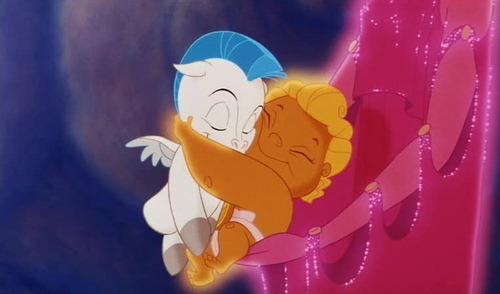
Athena (Minerva)
Athena was like the original Sasha Fierce. Ain’t nobody going to be messing with her. She is the goddess of like 12 different things: wisdom, courage, inspiration, justice, strength, strategy. The whole bit.
In Tales from Ovid, the Roman version Minerva makes a cameo appearance in the myth of Arachne since she is the goddess of weavers. (They really did have gods for everything.) When Minerva hears about Arachne’s abilities as a weaver-lady, she’s all like: “Aww hell no.” She comes down in a disguise (these disguises have to go, I swear) and challenges the mortal to a weaving competition. When it turns out that Arachne’s tapestry is better, Minerva gets pissed, Arachne tries to kill herself (chill, lady), and Minerva lets her hang there by a thread, thereby giving the world spiders. Thanks a heap, Minnie.
Athena stirs the pot in Trojan Women. When she was making offers to Paris trying to get that stupid golden apple, she offered him skill and victory in battle. Who needs that when you can have a hot wife though, right? Allegedly, she was also the one to side for the Greeks and let the Trojan Horse prance right into the city and unload the army. Hecuba was not pleased. Odysseus comes up to Hecuba rooting for Athena and calling her the goddess of “strategy and invention” to which the destroyed Queen retorts “of cunning and deceit.” We’ve got a small disagreement on our hands here.
The Greeks of An Iliad benefited quite a bit from Athena, though. (They did name a whole city-state after her, after all.) Look how they bejeweled her statue:

Bow Down.
In any case, Athena is the one who saved sassy Achilles from being completely obliterated by King Agamemnon when he mouthed off to him. Just as Agamemnon was about to take Achilles to school, Athena dipped down from the sky (like ya do), grabbed him by the hair (catfight style), and tells him to stop (served). Athena then pushes it into full speed ahead fighting for the Greeks, going so far as to stab her own brother Ares in the stomach during a celestial battle. Ouch. She’s a cold-hearted snake, look into her eyes. The Trojans were suffering so much that Hector went through the city urging folks to go pray to Athena that she would stop fighting for the Greeks. She doesn’t really seem like the most sympathetic party, though, right?
Who run the world?
Aphrodite (Venus)

Aphrodite, goddess of love and beauty and procreation. Everyone’s favorite. Until she promises Helen of Sparta to Paris in a competition to have a golden apple (that you can’t even eat) which sparks a decade-long war that kills thousands of people. But who’s counting—all you need is love.
The Roman goddess Venus works her romantic magic in Tales from Ovid. It is Venus who takes pity on Pygmalion when he asks for a mate and turns his marble idyllic statue to life. (One can dream, folks.) Later, Venus gets hit by the arrows of love herself. When Myrrha flees her father’s house after having an incestuous relationship with him (ummm, ew), she ends up praying to Venus on a shore. Obvious choice. Venus decides to spare Myrrha and turns her into a tree (hint: myrrh) and even lets her unborn child Adonis be preserved in the bark and born from a tree! I hear that’s preferable to Jove’s thigh. When Adonis grows up, Venus somehow falls in love with him but – get this – it doesn’t work out. If the goddess of love can’t get her own love life in order, what will come of us mere mortals?
Biddies adore the goddess of love. Exhibit A:
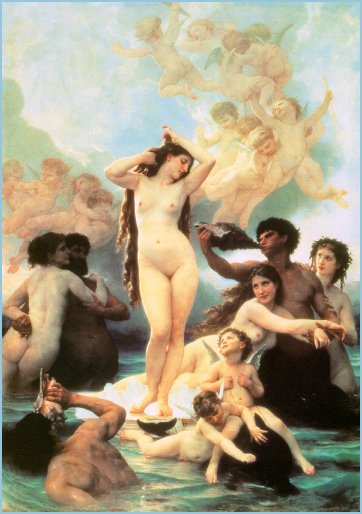
The narrative of Trojan Women tells us how Aphrodite won the golden apple by offering Helen of Sparta to Paris. You have to hand it to Aphrodite—she knows the way to a man’s heart is through other women. Somehow, Hecuba offers up an endless defense for the goddess, despite the fact that her city is in ruins. “You make fools of the gods,” she tells Menelaus. If only Hecuba could read this blog post…
Aphrodite stays somewhat quiet for An Iliad, being referenced at the beginning for her ubiquitous deed with the golden apple (see above). She then keeps a watch over Paris. When the young man tries to go down and fight, Aphrodite promptly picks him up and throws him back into Helen’s bed. There are worse places for a man to be, I suppose.
Poseidon
In truth, Poseidon, god of the sea, only appears in one of this season’s shows: Trojan Women. He plays a dramatic role at the beginning and ending, coming on stage clad in light blue with these long, intense speeches. The opening monologue details the battle of Troy from start to finish and introduces the image of the ever-desirable golden apple. He talks about how he built Troy with his brother Apollo. No big deal. He vows to take vengeance on Odysseus by giving him rough seas for the journey home. (You ever heard of The Odyssey?)
But Poseidon gets a page here because of the wonderfully terrible portraits of him that float about on the interwebs. These are priceless:
WERK.
And, naturally, Anthony Hopkins-Poseidon:
How inviting. If you’re in want of more entertainment, head on over to Google Images and type in “Poseidon god.” Endless laughs, and lots of carefully placed waves, if you get my drift.
Apollo (Phoebus)
 The god Apollo is a pretty intense dude. Being one of Zeus’ (many) sons, Apollo is recognized as the deity of the sun, light, truth, music, healing and plague. He’s often shown as a beardless youth playing a harp. But he’s intimidating, I promise. Don’t let the harp fool you.
The god Apollo is a pretty intense dude. Being one of Zeus’ (many) sons, Apollo is recognized as the deity of the sun, light, truth, music, healing and plague. He’s often shown as a beardless youth playing a harp. But he’s intimidating, I promise. Don’t let the harp fool you.
The Romans call him the name Phoebus. One of the first myths in Tales from Ovid portrays the story of Phoebus’ son Phaeton coming to him and asking to borrow the chariot of the sun. (Read: “Dad, can I borrow the Porsche?”) After much ado about something, Phoebus reluctantly agrees to let his son take the fiery horses for a spin. Yes—real fire. When the horses get out of control and derail the chariot, they dip low to the earth and set the planet ablaze. Being the dumb teenager he is, Phaeton can’t find a way to stop them, so Jove has to intervene, sending down one of his famous lightning bolts which forces Phaeton out of the chariot, falling to earth like a star. Sounds more romantic than it actually is.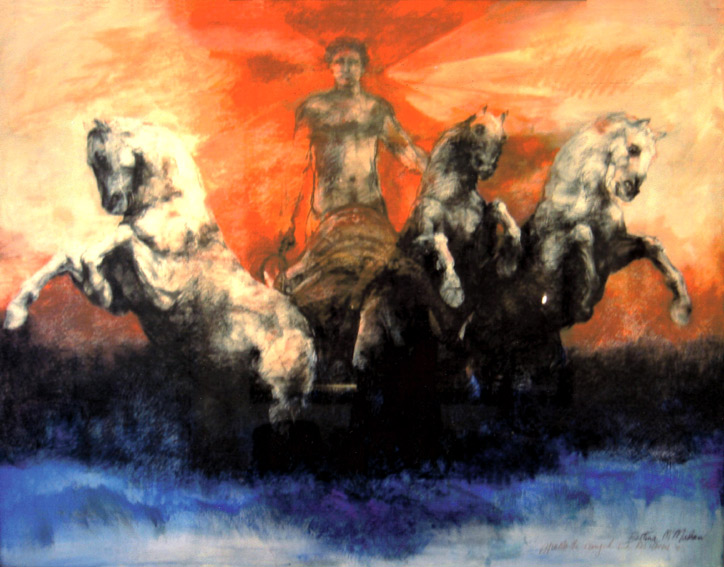
One of the Trojan Women, Cassandra, is dedicated as a holy virginal priestess to Apollo. He is the god who endowed her with clairvoyant abilities which makes her seem a little bit crazy. Of course, the Greeks couldn’t care less if she is a priestess – Agamemnon decided she will be one of his concubines. It’s not a great time to be a woman back there in ancient Greece. To read about poor Cassandra’s end see: The Orestia.
For reasons like this, Apollo wasn’t a big fan of the Greeks in the Trojan War. In An Iliad, he shoots the Greek camp with an arrow of sickness that wipes a bunch of them out after they capture one of his priestesses. (What is up with these Greek men and the priestesses?) In a more dire circumstance, when Patroclus goes out to fight in Achilles’s armor, Apollo swoops down and knocks off the armor so Hector can clearly see how best to kill his opponent. Not a bright moment for Patroclus. Or really any of the Greeks for that matter.
Hermes

Much like Miley Cyrus, Hermes is a god who gets the best of both worlds. As the god of boundaries and transitions (it’s so meta, I know) he gets to be the intercessor between the mortal world and the divine. He also gets the pleasant job of escorting you to the underworld once you die. But I bet he got to meet some pretty swag people. (Looking at you, Plato.) The task he’s probably most famous for is being the mailboy of the gods, bringing their messages to and fro with his little winged-feet (see: Disney’s Hercules).
Hermes makes one grand appearance in the ArtsEmerson season in An Iliad. King Priam goes to fetch the body of his dead son that is being drug around behind a chariot, and all of the sudden, POOF! there’s a special messenger boy offering to personally escort Priam to the tent where Achilles is having dinner (read: drunk). The god busts open the doors to the room and is all like, “Here ya go, Pri-Pri. Thank me later. P.S. I’m Hermes.” And then he’s gone. Way to be, Herms. Short and sweet and to the point.
Of course, lest we should forget, all good knowledge of the gods comes from Hercules so, obligatory Hermes shot:
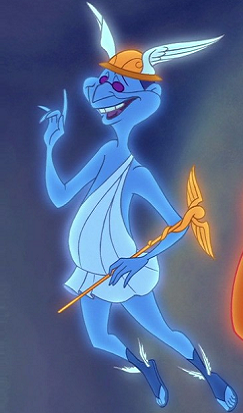
And those are the gods of the season. Hopefully I haven’t angered them too much. It was all in good jest, I swear.
(Lightning bolt strike)




Leave a Reply